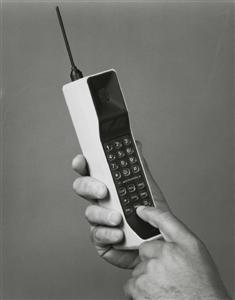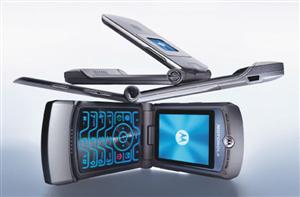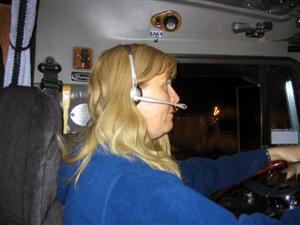FEBRUARY 2005 TRUCKER TALK
I CAN HEAR YOU NOW!
By Writers and Owner
Operators Rod & Kim Grimm
How did we ever truck before the cell phone? Today we enjoy 4000 anytime minutes, free nights and weekends, call waiting, super small phones, no long distance charges and free calls between users on the same network. And all this for only pennies compared to the plans of yesteryear. And the service just keeps getting better and better. But it hasn’t always been this way.
Not so long ago, if you had a “portable” phone, it was in a bag nearly as big as a suitcase. And the plans available meant you kept conversations short and sweet. At $1 a minute and enormous roaming fees, cellular phones were for emergencies only – not for rambling on in conversation with a friend. But even before that, it was worse.
Remember when you had to use a pay phone when out on the road? So much time was wasted trying to find a safe pay phone that worked. And by the time you made your call and got back on the road, you lost a minimum of half an hour, just to call a shipper or receiver to see if they would wait for you. After you stopped, you were tied to the phone you found until you were done with all your calls. And if you were waiting for a call back, forget about it, you were stuck. I can remember always trying to find a pay phone when we stopped to eat, and how frustrating it was to find a tourist there, with no schedule to keep or check-in call to make. So you waited. At least you were saving a little time when you could eat, talk and then leave. Calling cards helped make conversations longer, and mega-minute cards for five cents a minute helped even more. I think pay phones will find themselves going the way of the dinosaur. Most truck stops still have pay phones, but they get less common all the time (and more expensive).
 Nowadays,
everyone walks around with a hands-free device in their ear and talking
while they eat or pay for fuel and get coffee. Talking on the phone no
longer slows you down. Many times I’ve had people think I’m talking to
myself when they can’t see my hands-free earpiece – and I’m just talking
away, looking like a lunatic. And I’ve thought the same thing about other
drivers as well, and then you realize that they are on the phone and give
the appropriate, “Oh, you’re on the phone, sorry,” remark. It’s a part
of the world we live in today, and I for one think it’s GREAT.
Nowadays,
everyone walks around with a hands-free device in their ear and talking
while they eat or pay for fuel and get coffee. Talking on the phone no
longer slows you down. Many times I’ve had people think I’m talking to
myself when they can’t see my hands-free earpiece – and I’m just talking
away, looking like a lunatic. And I’ve thought the same thing about other
drivers as well, and then you realize that they are on the phone and give
the appropriate, “Oh, you’re on the phone, sorry,” remark. It’s a part
of the world we live in today, and I for one think it’s GREAT.
Drivers can now talk to loved ones at home for hours if they want to, instead of merely finding out about the “big” things that happened that day, along with a quick “I Love You” before they had to hang up. And that was if they even got to call every night. Now a driver’s family back home knows they can get in contact with their loved one on the road almost anytime, any place. If there is an emergency at home, you don’t have to call dispatch to have them put a block on their fuel card and wait till they need fuel, realize they can’t get it, and call to find out why. Or you could send a message on the Qualcomm, but not all trucks were equipped with even this technology. Being able to keep in touch, instantly, helps us all do this crazy job we do even better. And unless you run local, days, weeks or even months sometimes pass before you can make it home again, so keeping in touch is important.
The cellular phone has many direct job benefits for truckers. I remember one morning in New Orleans when we’d gotten bad directions. Drivers have this 6th sense about correct directions and, thankfully, when I got that feeling, I was able to call and tell someone, “We’re at the corner of Yida and Yada, how do we get where you are?” The man on the dock was able to tell us exactly where to turn and we got there no problem. I hate to think of where we might have ended up in the French Quarter (navigating through those small and crowded streets would have been a lot of fun). But bad directions are just a part of the job. I still wonder some days how many Americans find their way to work, because they wouldn’t get there going the way they tell us. But the cell phone at least helps! While we still get lost from time to time, we no longer have to find the pay phone and make the call before moving on. We call and drive.
We always use our hands-free when driving. The states with laws requiring it are right. Late at night, when you start getting a little tired or just bored out of your mind, its easy to call a friend that’s up all night too and talk while you drive. This usually helps us to both make lots more miles. It’s almost like running with friends and talking on the CB. That always makes the miles go by faster. Our cellular phone also allows us to make sure friends are OK, especially when we know that they are going to be in some crumby weather. We now have a service on our phone that allows us to check weather reports across the country for accurate, up-to-the-minute conditions (for an extra $2.99 a month). Before Bob and Suzanne Stempinski got off the road, we used to give winter weather reports to each other, depending on who got to Wyoming first. Sometimes it would take us half a dozen phone calls from cell phone hell. But as coverage areas increase, “cell phone hell” is getting smaller and smaller. More and more towers keep popping up everywhere you look.
Have you seen the cell phone tower tree? I couldn’t believe it when a friend told me to look for the first one I saw. Going south on 189 into Provo, Utah, they’ve tried to disguise this tower to look like a pine tree. And it does – it looks like an old artificial Christmas tree. Now there is another one when you’re going west on I-80 down the hill before Nyack, California. Just look up on the top of the hill, it’s the tallest and straightest “tree” up there. The ones that look really funny are the ones they put up where there are no pine trees – like in the desert community of Victorville, California. I’ve seen a few of these “tree” towers along Interstate 15 there too and boy do they stand out. What will they think of next?
 Another
benefit of having your cell is the ability to call for help if you break
down or get into an accident. Let’s face it, it’s not like it used to
be when three or four trucks would stop to help someone. Even at home,
when you are running errands, the cell phone comes in handy. Cell phones
allow us to make a quick call home to say, “I’m running a little late,”
or “Do you need me to get anything before I come home?” Now, most teenagers
have phones and are able to keep in touch with parents and get help if
they get into a situation where they need it. This gives parents a little
piece of mind.
Another
benefit of having your cell is the ability to call for help if you break
down or get into an accident. Let’s face it, it’s not like it used to
be when three or four trucks would stop to help someone. Even at home,
when you are running errands, the cell phone comes in handy. Cell phones
allow us to make a quick call home to say, “I’m running a little late,”
or “Do you need me to get anything before I come home?” Now, most teenagers
have phones and are able to keep in touch with parents and get help if
they get into a situation where they need it. This gives parents a little
piece of mind.
One day I was walking back to the motel after I’d gotten my nails done and a van slowed down and almost stopped near me. I quickly called Rod and gave him a description and told him I thought it was suspicious. The driver went on, but I made sure he could see I was on the phone. You just never know these days. On a news channel on our XM radio one day, they were telling about this woman in Elk City, Oklahoma. She had just got to work when this guy grabbed her and forced her into her trunk. Thankfully, she had her cell phone in her purse, and she was able to call her husband or boyfriend. He got a hold of police and they tracked her phone. She was lucky – police got there and caught the guy. Had she not had that phone, who knows what would have happened to her.
We now have camera phones, and I think they too will be the norm soon. Camera phones benefit drivers in many ways. If you’re a driver and have small children at home, you can now take pictures of first steps or a messy supper and e-mail them. When the snow is as high as your trailer on Donner Pass, take a picture and e-mail it home. And, hopefully, you wouldn’t ever have the need to take pictures of an accident, but if you did, you could. It’s always a good idea to carry at least a throw-away camera in your truck for this specific purpose, but your cell phone is usually pretty handy too.
Of course there are times when a cell phone is not welcome – like at the movies, church, a funeral, or a wedding. There’s nothing like saying “I do” and having someone’s cell phone ring out the theme of The Lone Ranger for all to hear. And sometimes it’s nice to just turn it off. The world can wait an hour while you rest your brain. Some restaurants are now putting up signs discouraging people from using their cell phones while in their establishment. At this point they are just friendly suggestions, but I bet at some point they’ll get more aggressive at limiting cell phone use in certain areas. We all need to be thoughtful of others as we chat in public. And nothing is worse than when your phone goes dead, so be sure to plug it in and recharge the battery when you are not using it.
Today’s convenient cellular phones are the six-shooters of the old days. There’s one on nearly every hip. But instead of “shooting them down” these handy little devices help us keep in touch like never before. So keep talking and be safe doing it – and be glad you don’t have to carry around one of those huge “brick” phones anymore!
Copyright
© 2005 10-4 Magazine and Tenfourmagazine.com
PO Box 7377 Huntington Beach, CA, 92615 tel. (714) 378-9990 fax
(714) 962-8506

